- 欧州特許出願が、同じ出願人に付与された欧州特許と同一の主題を主張し、EPC54条2項および3項に基づく先行技術の一部を形成していない場合、EPC97条2項および125条に基づいて拒絶することができる。
- 出願は以下の有無に関わらず、当該法的根拠に基づいて、拒絶されうる。
- a) 既に付与された欧州特許の欧州特許出願と同日に出願されたか、または
- b) 既に付与された欧州特許の欧州特許出願の先の出願または分割出願(EPC 第 76 条(1))であるか、または
- c) 既に付与された欧州特許の欧州特許出願と同じ優先権(EPC 第 88 条)を主張するものか。
1. A European patent application can be refused under Articles 97(2) and 125 EPC if it claims the same subject-matter as a European patent which has been granted to the same applicant and does not form part of the state of the art pursuant to Article 54(2) and (3) EPC. 2. The application can be refused on that legal basis, irrespective of whether it
a) was filed on the same date as, or
b) is an earlier application or a divisional application (Article 76(1) EPC) in respect of, or
c) claims the same priority (Article 88 EPC) as
the European patent application leading to the European patent already granted. (Headnotes of the Enlarged Board of Appeal (EBoA)) EBoA of the EPO, Decision of 22. June 2021 – G4/19 – Double Patenting
The appellant claimed priority of a granted EP Patent having the same subject matter
The appellant is the applicant of the European patent application-in-suit. The Examining Division of the European Patent Office (EPO) refused the application-in-suit. The refusal was based on the principle of the prohibition on double patenting. The application-in-suit claimed priority of a granted European patent, see figure below. The subject matter of the application-in-suit and the granted European patent comprised the same subject matter and are owned by the same applicant. Against the refusal of the Examining Division, the applicant of the application-in-suit filed an appeal.
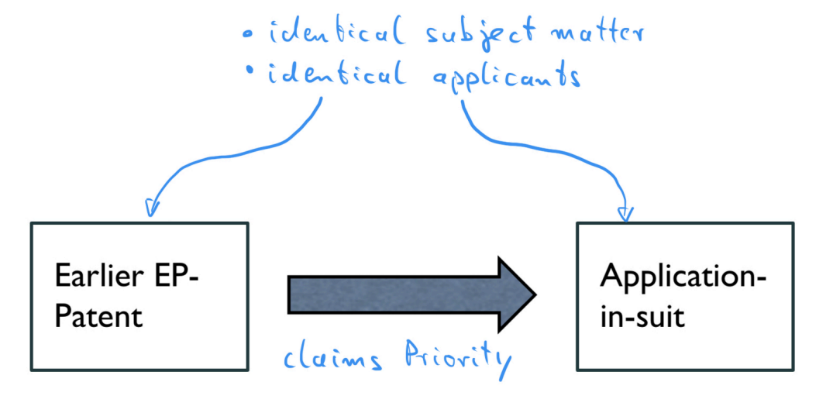
The Board of Appeal (BoA) referred questions to the Enlarged Board of Appeal (EBoA)
In the appeal proceedings the BoA referred the following questions to the EBoA: “1. Can a European patent application be refused under Article 97(2) EPC if it claims the same subject-matter as a European patent which was granted to the same applicant and does not form part of the state of the art pursuant to Article 54(2) and (3) EPC? 2.1 If the answer to the first question is yes, what are the conditions for such a refusal, and are different conditions to be applied depending on whether the European patent application under examination was filed
- a) on the same date as, or
- b) as a European divisional application (Article 76(1) EPC) in respect of, or
- c) claiming the priority (Article 88 EPC) in respect of a European patent application on the basis of which a European patent was granted to the same applicant?
2.2 In particular, in the last of these cases, does an applicant have a legitimate interest in the grant of a patent on the (subsequent) European patent application in view of the fact that the filing date and not the priority date is the relevant date for calculating the term of the European patent under Article 63(1) EPC?”
EBoA gives an interpretation of the referred questions
- The essence of question 1 is according to EBoA, whether there is any legal basis under the EPC for refusing an application on the ground of “double patenting”. The term “double patenting” is interpreted in the narrow sense, where two or more EP applications are involved (and not a national patent).
- The definition of the “same subject-matter” or “the same applicant” is not the subject of the present referral.
- Further, the referred question 1 is restricted to substantive examination proceedings before the Examining division. Therefore, the referral does not extend to the question of whether and how the prohibition might be applicable in opposition proceedings.
- It is the EBoA’s understanding that in current Office practice an objection of double patenting is only raised if there are overlapping and still valid designations in both the granted patent and the application concerned.
- The essence of question 2.1 is as follows: if there is a legal basis in the EPC for the prohibition on double patenting, are all three of the possible constellations in which double patenting may arise to be treated in the same manner? Common to these constellations is that the granted patent and the application both have the same effective date.
Decision of the EBoA in regard to Question 1
For its decision, the EBoA concludes that Art. 125 EPC (https://www.epo.org/law-practice/legal-texts/html/epc/2016/e/ar125.html) serves as a legal basis for the decision. Art. 125 EPC defines in the case of the absence of procedural provisions in the EPC, that the EPO shall take into account the principles of procedural law generally recognized in the Contracting States. To find out whether there is such a principle, the EBoA inter alia considers the preparatory documents of the Convention (= “travaux préparatoires”). Especially based on these documents the EBoA inferred that the prohibition on double patenting is such a principle generally recognized in the Contracting States according to Art. 125 EPC. As a consequence, the EPO is empowered and duty-bound based on Art. 125 EPC to apply the principle of the prohibition of double patenting. Therefore, the EBoA answered Question 1 in the affirmative. As a result, a European patent application can be refused if it claims the same subject-matter as a European patent that has been granted to the same applicant and does not form part of the state of the art pursuant to Article 54(2) and (3) EPC.
Decision of the EBoA in regard to Question 2.1 and 2.2
Questions 2.1 and 2.2 refer to certain conditions for a refusal based on double patenting. The EBoA derived the answer on Questions 2.1 and 2.2 mainly from the preparatory documents of the Convention again. The answer is pointed out in Headnote 2 above.
Overview of the different constellations in regard to the prohibition of double patenting based on the present decision of the EBoA
Below the different constellations according to the headnotes of the present decision are shown. Common to these constellations is that the granted EP patent and the EP application both have the same effective date.
- The EP patent application was filed on the same filing date as the EP patent application leading to the EP patent already granted (headnote 2a):
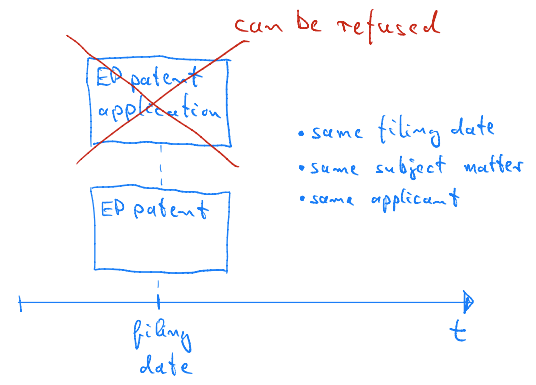
- The EP application is an earlier application in respect of the EP application leading to the European patent already granted (headnote 2b):
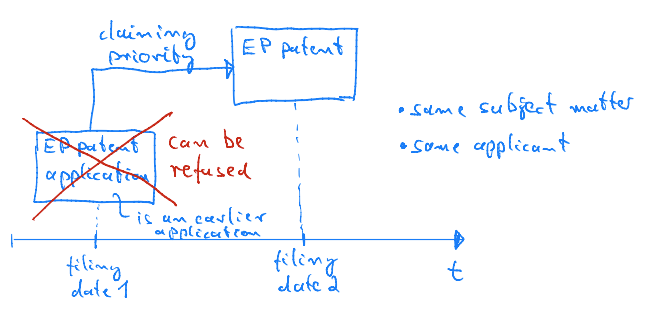
- The EP application is a divisional application (Article 76(1) EPC) in respect of the EP patent application leading to the EP patent already granted (headnote 2b):
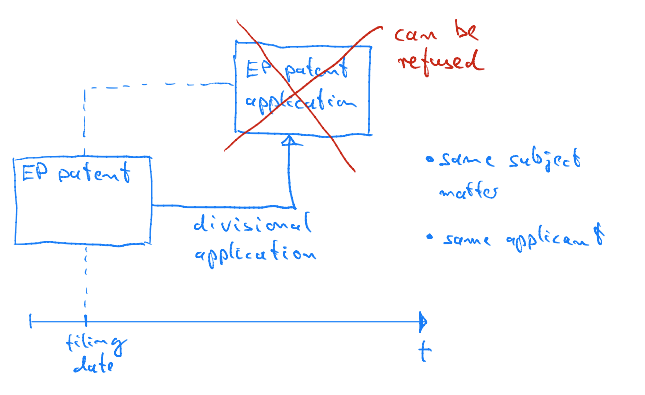
- The EP application claims the same priority (Article 88 EPC) as the EP application leading to the EP patent already granted (headnote 2c):
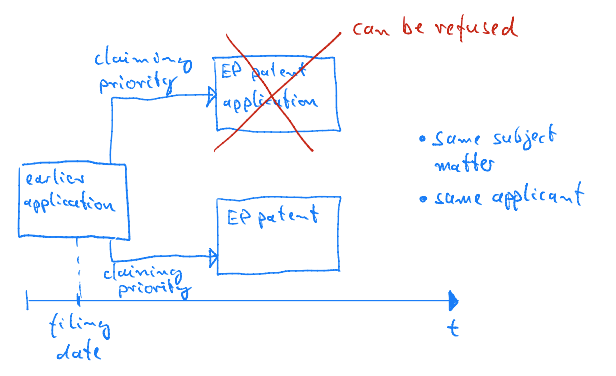
- The EP application claims the same subject-matter as a EP patent which has been granted to the same applicant and does not form part of the state of the art pursuant to Article 54(2) and (3) EPC (headnote 1):
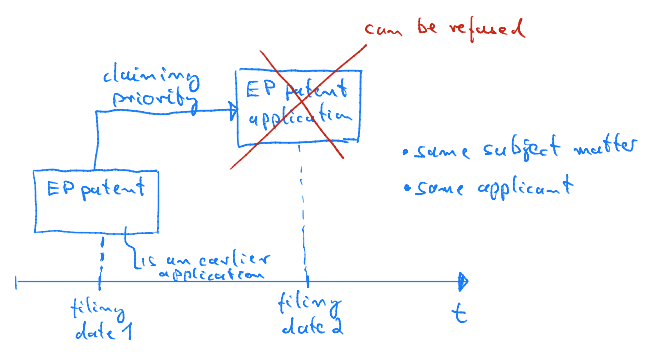
Consequences for practice
An applicant can have the legitimate interest to have a second EP patent application granted for the same subject matter. E. g. an interest can be the longer term of protection available to an applicant as a result of claiming an internal priority. Nevertheless, according to the present decision of the EBoA a European patent application can be refused based on the prohibition of double patenting irrespective of whether there is a legitimate interest of the applicant. To overcome the prohibition of double patenting, the applicant could amend one or more of the applications in such a manner that the subject-matters of the claims of the applications are not identical. For example, the applicant could adapt the applications such that the subject matters are partially overlapping. In such a case no objection regarding double patenting should be raised (see also the decision of the BoA T 877/06). A further strategy could be that the applicant in a first step tries to get an EP patent application with a narrower subject matter/scope of protection granted. Then, in a second step, the applicant could try to get an EP patent application with a broader subject matter/scope of protection granted. Thus, the applicant would already have a narrower EP patent and can then possibly try to obtain another EP patent with a broader scope of protection more freely and flexibly. This approach is especially beneficial for important inventions. To overcome the prohibition of double patenting in general the applicant could follow the proposals in the Guidelines for Examination G-IV-5.4 https://www.epo.org/law-practice/legal-texts/html/guidelines/e/g_iv_5_4.htm): withdraw overlapping designations, or choose which one of those applications is to proceed to grant.
Enlarged Board of Appeal Decision G4/19: http://documents.epo.org/projects/babylon/eponet.nsf/0/9D699BFBD3CC2C11C12586FC00338610/$FILE/G_4_19_decision_of_the_Enlarged_Board_of_Appeal_of_22_June_2021_en.pdf
